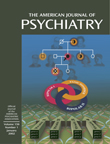Slower Treatment Response in Bipolar Depression Predicted by Lower Pretreatment Thyroid Function
Abstract
OBJECTIVE: Because treatment of the depressed phase of bipolar disorder is a clinical challenge and hypothyroidism is known to be associated with depression, the authors examined the relationship between pretreatment thyroid values and response to antidepressant treatment. It was hypothesized that subjects with lower thyroid function, even within the normal range, would have a poorer response to initial treatment. METHOD: The subjects were 65 patients in the depressed phase of bipolar I disorder who were enrolled in a larger ongoing study. A panel of thyroid measures, including thyroid-stimulating hormone (TSH), thyroxine, triiodothyronine resin uptake, and free thyroxine index (FTI), were determined before initiation of algorithm-guided treatment. The effect of each thyroid measurement on time to remission was estimated by using the Cox proportional hazards model. RESULTS: Both lower values of FTI and higher values of TSH were significantly associated with longer times to remission, i.e., slower response to treatment. Outcomes were relatively poor unless patients had FTI values above the median and TSH values below the median. Patients with this optimal profile experienced remission 4 months faster than the remainder of the study group. CONCLUSIONS: This study provides further evidence that patients with bipolar disorder are particularly sensitive to variations in thyroid function within the normal range. Our results suggest that nearly three-quarters of patients with bipolar disorder have a thyroid profile that may be suboptimal for antidepressant response. It remains to be seen whether pharmacological enhancement of thyroid function will facilitate recovery from bipolar depression.



